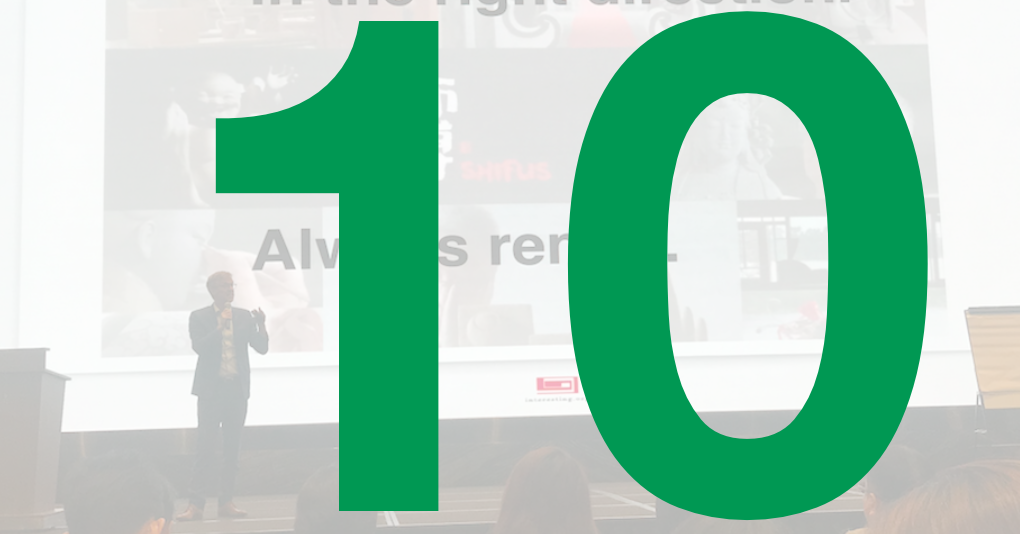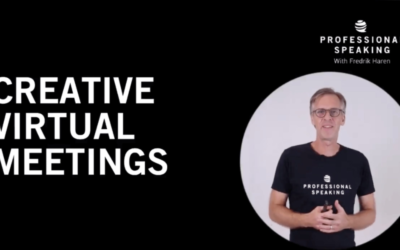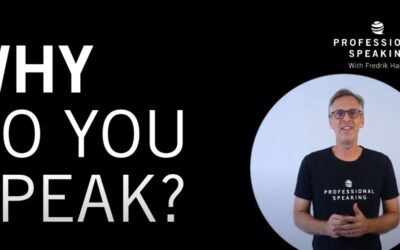
In all the different ways a speaker can get feedback, which way is the most valuable?
There are many ways for a professional speaker to get feedback, and in almost 20 years as a inspirational keynote speaker I have gotten loads and loads of feedback. So based on the different ways you can get feedback what is the most valuable?
Here is my top 10 list:
10:
Other speakers.
It’s great to have other speakers from a conference give you feedback, they have spoken at the same conference, know the audience etc but let’s be honest: Most speakers will give “polite feedback” to not appear rude, or inte some cases hold back on the valuable feedback because they – wrongly – look at you as a competitors.
So take feedback from other speakers at the same convention with a grain of salt.
9:
The Audience Right after a speech
It is easy to think that the most truthful and genuine feedback you can get as a speaker is from the audience members right after they heard you speak. I mean, the speech is after all given to the audience and what better way to ask them than right after they heard it, right?
But the feedback tends to be of the type: “Oh, I loved your speech!”, “Thank you for that inspirational speech” and “Oh, that was amazing!” etc.
In other words overly positive – but generally not very specific feedback.
As a speaker there is another reason why you might want to tell yourself that feedback right after a speech is the best and that is because the feedback you get then is usually very positive…
I do not look at comments right after a speech as feedback – but as praise. Nice to get but not very valuable in becoming better.
8:
Social Media
Same thing as “Audience right after a speech” when it comes to positive feedback (ie feedback generally too generic). But also a big chance/risk that the negative feedback is irrelevant, or not really representative of what the audience thought. (Social media can be nasty but nasty comments are generally not what the average person thought about something but written by “trolls” who are rare, but angry beings…)
7:
Staff/Partners:
Even if speakers often do not have big staff they often work very closely with some kind of partner (often, as with me, that partner is the life partner of the speaker.) My wife, bless her, has spent endless hours over the years listening to me share my concerns, issues, and ideas.
The good thing with partners is that often know us better than we know ourselves so they can tell us things that are really true but that we can not tell ourselves because we can not see it.
6:
Ourselves.
As speakers we tend to spend a lot of time evaluating ourselves. (I would say speakers (at least GOOD speakers) are their toughest critiques, not many professions will film their own performance and look at it to see how they can become better, but speakers regularly do.)
We are good at feeling when something did not go well, what we did wrong and when something worked. We are less good at seeing what we could have done instead. So for really break through improvements just evaluating yourself is not enough.
5:
Peers:
Any serious professional speaker has a network of other speakers he/she can use to check new content, debrief speaking experiences with and discuss business decisions. I will often call one of my speaker buddies to de-brief what went well, what went badly, what I could have done better etc. A good speaker buddy should be like a best friend: give you honest raw and brutal feedback – but with love.
The bonus with this kind of feedback is that you often learn as much from listening to another speaker as you do from getting their feedback on yours.
4:
Coaches:
Voice coaches, storytelling coaches, presentations skills coaches etc. They all have unique skills on how to make a speech better. If you have the chance to get feedback from experts, do it. They will very likely take your speech to the next level. The downside is that sometimes they might focus on the skills they are good at and miss the overall idea that you have. But use experts, it makes you better.
(For 4-6 all of these feedback versions become much more valuable if they are done by evaluating you on a video.)
3: Audience feedback
What the audience writes in the evaluation forms is gold. The rating (1-5 or 1-10 etc) is valuable, but the real gold is in the comments. One good thing with evaluation forms is the the people writing them usually do not think the speaker will get to read them (they think they are writing to the client) so the comments will be honest, real and uncensored.
Same with emails that people write you a few days after the speech. in emails like that you will get information about how you actually changed a persons life.
2:
The clients.
As speakers we are giving our speech not only to the audience, but also to the client. Sometimes the client might have asked you to, for example, provoke the audience to think in new ways. In that case the audience might not love the speech (because they got challenged) but the client will love it. Other times the client is asking the speaker to deliver a uncomfortable message to the group because the client doesn’t want to deliver it him/herself. In cases like that the evaluation forms might show a result that is more negative than what the client thinks, since the audience doesn’t know what the brief was.
Since the client is actually the one giving you the brief and booking you, the feedback from the client is one that really knows what you were booked to do.
The downside is that clients sometimes will give you a more “polished” feedback than what they really think. A good way to get more real feedback from clients is to have your assistant/partner call to get the feedback.
Which leads us to number 1.
1:
Speaker Bureaus (or event managers):
On Friday I had the privilege to speak to all the employees of adidas in Guangzhou. But I also had the privilege to spend a few hours with Priscilla Chan of Speakers Connect, the speaker bureau that gave me the booking.
Over dinners, coffee – and on the train back from the booking – Priscilla gave me advise not only on my speech, but other relevant things from everything from my mindset, my future speaking career, the latest trends she sees and many, many other things.
I learnt a lot from those conversations with Priscilla on this trip.
The bureau is as updated on the brief as the speaker/client, but also has an “external” view on the assignment. This makes the bureau unique in being able to be objective yet very initiated.

Conclusion: Of course the best feedback alternative is a combination of all the ten above. The important thing is to eat as much feedback as you possibly can.
Sometimes it hurts.
Sometimes it makes you glow.
Sometimes you get very little out of it.
Sometimes you get a lot
Sometimes you totally agree.
Sometimes you do not agree at all.
But every single time you get feedback you will learn. And when we learn we become better.
Feel free to give feedback on this text 🙂




